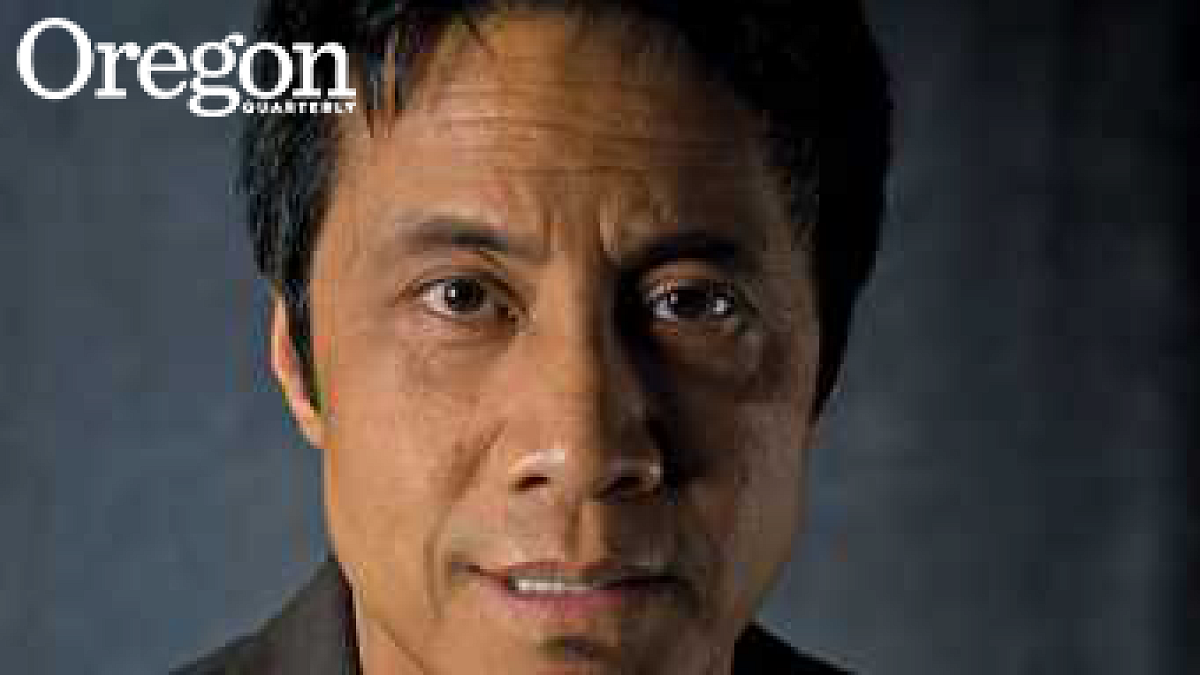Former Seattle Times and Los Angeles Times correspondent Alex Tizon is used to telling other people’s stories. With the publication of his memoir, the University of Oregon journalism professor became the story.
Big Little Man: In Search of My Asian Self is Tizon’s examination of the Asian male experience in America. He describes growing up in a culture where Asian women were seen as sexy, subservient, and desirable, while Asian men were viewed as small, cowed, obsequious, utterly sexless, and nearly invisible. He writes about coming of age ashamed of his skin color, his height, and his face.
His words struck a chord. Dozens of newspaper, radio, TV, and digital journalists interviewed him and reviewed the work. “Searingly honest,” said the New York Times. “A devastating critique of contemporary American culture,” trumpeted the Seattle Times. “Well-paced” and “engaging,” noted Publishers Weekly.
Not everyone sang such praises, however. One especially harsh commentator—an Asian American male who is a contributing editor at New York Magazine—hit a nerve, writing, in a review that ran in the Los Angeles Times, that the book was preoccupied with body-size issues.
Tizon briefly debated his critic on social media—then moved on.
“I’ve been reminded what it’s like to be asked deeply personal questions and to have your insides revealed in public ways, and not always in a flattering light,” Tizon says. “It’s good to be reminded of that kind of vulnerability. It makes me more sensitive and sympathetic to the people I write about.”
Tizon writes about people a lot. After earning a graduate degree from Stanford University, he carved out a national reputation as an immersion journalist, a long-form narrative nonfiction writer. For two decades, he provided dispatches, essays, and observations from 35 states and half a dozen countries. In 1997, he was corecipient of the Pulitzer Prize in investigative reporting for his story on corruption and inequities in a federally sponsored housing program for Native Americans.
Tizon’s own story details his family’s immigration from the Philippines. Initially, they struggled to gain a foothold and moved frequently, with stints in Los Angeles, New York, and Seattle. After crisscrossing the country, he spent his adolescence in Umatilla and Salem, Oregon. Later, he settled into undergraduate life at the UO. In college, he wrote, he got “used to being the only Asian in class.” On campus, it seemed, Asians were “dots in a white sea.”
It was at Knight Library that Tizon, as an undergraduate, first began researching Ferdinand Magellan, the Portuguese explorer who was killed on the island of Cebu in the Philippines. Tizon opens his memoir with a visit to that island to make a point: “Men like me,” he writes, “yellow- and bronze-skinned sons of Asia—could stand up to the power of Western men.”
As a newspaper journalist, Tizon wrote stories that covered an enormous range of contemporary characters, historically significant events, sensitive subjects, and places—from presidential campaigns to homeland security, the aftermath of 9/11, and weather disasters. He also told stories of outcasts, oddballs, true believers, and orphans. At the Seattle Times, Tizon was a “high-end general assignment writer,” the “resident storyteller” and “narrative essayist,” says Jacqui Banaszynski, the paper’s former associate managing editor.
“He wasn’t restricted in subject matter,” Banaszynski says. “He is not a narrowly focused talent. Some subcultures are of interest to him. He loved to go into those and learn them or understand them. He was drawn to stories of underdogs, but he’s more nuanced than that.”
“Alex wrestles with the humanity at the center of any story. He is driven to explore undercurrents of the human condition,” notes Banaszynski, now the Knight Chair in Editing at the Missouri School of Journalism.
In September, the UO School of Journalism and Communication published Interviewing: The Oregon Method. Tizon contributes a poignant essay about interviewing trauma victims. He shares personal insights into his interviews with a father whose daughter was raped and murdered. He tells of his relationship over time with that source, and the unexpected connection he felt with that story.
“Whatever strength I have as a journalism teacher comes from having done, for 25 years, the work of a journalist,” Tizon says. Students can sense the difference between learning theoretical approaches to interviewing and “hearing what it’s really like to take notes in the rain, on a dark street, while standing face-to-face with a scarred-up, tattooed Black Gangster Disciple who would just as soon rob you as answer your questions.”
“I draw from my experiences interviewing heads of state, killers, victims, activists, gang members, poets, and lots of ordinary folk,” Tizon says. “I spent my working life telling stories of other people, and now, for a little while and on a smaller scale, I’m on the other side of the process.”
—By Stuart Glascock
* * *
Big Little Man: In Search of My Asian Self by Alex Tizon
At age 14 I began keeping files. Figurative files in my head, but also actual file folders with headings such as “Great Orientals” and “Asians in the News” and “Oriental vs. Asian?” scribbled in big Sharpie letters. Whenever I ran across anything fileable related to Asians, in particular pertaining to race and manhood and power and sex, I would make a note and tuck it away in one of the folders. I would clip articles from newspapers and magazines, make copies of reports, tear out pages of books. The folders became fat and unwieldy. They sprouted subfolders. The collection outgrew its ratty cardboard box and ended up in two metal file cabinets that my mother and I picked up at a garage sale. One was beige, the other black, and they sat side by side in our garage like two miniature office buildings.
—from Big Little Man: In Search of My Asian Self (Houghton Mifflin Harcourt, 2014)


